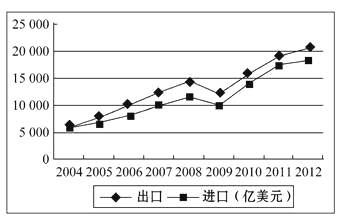问题
单项选择题
下图是2004~2012年我国对外贸易指标,图中数据显示()

A、产品进口优化了国内的产业结构
B、产品出口拉动了我国经济的增长
C、我国国内市场竞争的国际化趋势增强
D、我国“走出去”的步伐不断加快
答案
参考答案:C
解析:
【考点】经济全球化的影响
【分析】选C。解答本题的关键是仔细审图(包括:审标题、审项目——进口与出口、看变化),理解图表要说明的意思。看图表,2004~2012年我国的进口、出口整体呈快速上升趋势,这表明我国国内市场竞争的国际化趋势增强,C项符合题意;图表没有涉及产业结构、经济增长以及“走出去”内容,A、B、D三项与题意不符。故选C项。
【点评】本题属于图表型选择题,主要考查学生读图分析数据提炼观点的能力。
